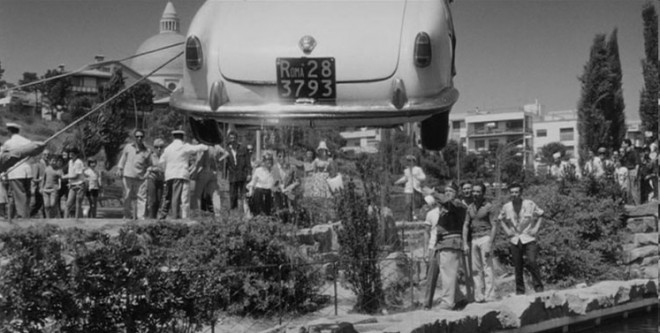What man at some point hasn’t known a woman like this? Insatiable, at the point of orgasm when she makes love, Saeko releases a tremendous accumulated store of water capable of replenishing life and even a river. Let’s not dwell on the fact that a lover of hers has already suspiciously drowned.
Yosuke used to live in Tokyo until he lost his job there and had to sell his house and move himself, wife and son elsewhere; now he is back, applying for unemployment benefits and searching for a job. Taro, an old philosopher, before he died homeless in Tokyo (a glimpse of Yosuke’s own possible fate), told Yosuke about a golden buddha he had hid in a closet in a house in Noto across a red bridge. It is his, Yosuke’s, if he can find it. It “will easily sell for a million yen,” Taro tells him in a flashback that materializes the dead man’s voiceover. Thus a symbol of wisdom has been reduced to the lure of cold, hard cash. Yosuke travels to Noto to claim the statue.
Saeko lives with her elderly grandmother in the house in question. While trying to find the bridge, Yosuke sidesteps a tiny puddle; mocking music becomes his soundtrack accompaniment. At the house a red parrot additionally mocks with its squawk. Saeko is wearing a red top when we first espy her. In a supermarket he visits to buy a boxed lunch, Yosuke espies Saeko shoplifting cheese and leaving a puddle beneath her. The return of an earring she also dropped becomes Yosuke’s entree into the house. She offers him the cheese, which is speckled with hot red pepper. Red in this film is the color of sex. Saeko removes her skirt in a flash, and their sex, according to her, is “cold, hot, and feels so good”—kinda like the cheese. “It’s welling up, the water,” she explains, as she sprays a window. Water now is pouring out of her. Yosuke keeps coming back for more.
Wearing a red cap, Yosuke works with the fishermen in Noto; Saeko points out where the river meets the Japan Sea, accounting for the plentitude of fish. But Yosuke is supposed to be in Tokyo looking for a permanent job, and before leaving there he forgot to wire his wife the unemployment money she pleaded for. During a cell phone call she calls her husband a “perpetual loser” and serves notice that she has sent him divorce papers. Adolescently, Yosuke smashes the phone and throws it into the river.
Shohei Imamura’s penultimate film, Akai hashi no shita no nurui mizu, has miles yet to go, with a sufficient number of visits from Taro’s voice and even materialization to suggest a ghost story. (It is a kind of perverse Ugetsu monogatari, 1953, with unemployment substituting for war and divorce for wifely death.) It is a pungent satire of a number of things: the male sexual drive; globalization; as a result of economic upheaval and sociopolitical readjustment, Japan’s cancellation of its promised offer of a job for life.
